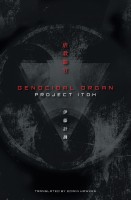 Author: Project Itoh
Author: Project Itoh
Translator: Edwin Hawkes
U.S. Publisher: Viz Media
ISBN: 9781421542720
Released: August 2012
Original release: 2007
Although Genocidal Organ was the third novel by Project Itoh to be translated and released in English, in Japan the book was actually his debut work as an author. My introduction to Itoh’s fiction was through the award-winning Harmony, his first novel to be translated into English, which I greatly enjoyed and found to be an intelligent, thought-provoking work of science fiction. I was also greatly impressed by his two short stories: “The Indifference Engine,” collected in The Future is Japanese, and “From Nothing, With Love,” found in Phantasm Japan. Thus, reading Genocidal Organ, released by Viz Media’s Haikasoru imprint in 2012 with a translation by Edwin Hawkes, was an obvious choice for me. The publication of Genocidal Organ in Japan in 2007 established Itoh as a talented author to watch out for. Sadly, he died two years later at the age of thirty-four from cancer. But Itoh and his work haven’t been forgotten. In 2014 it was announced that three of his novels, including Genocidal Organ, were to be adapted as feature-length animated films.
Ever since the attack on the World Trade Center on September 11, 2001, American citizens have more or less willingly given up their privacy and freedoms in order to feel safer from perceived terrorist threats. Much of the world has followed suit and there are very few places left where a person isn’t closely monitored and recorded, the immense amounts of data and metadata collected being saved indefinitely, waiting to be complied at a moments notice. In order to maintain this life of extreme hyper-surveillance there are people who must deal in death. Clavis Shepherd is one such man, an assassin who is a part of the Special Operations of the United States Military. He has killed countless people in service of his country—men, women, even children—but his recent missions have all had one target in common, an American linguist by the name of John Paul. Time and again the man seems to manage to slip away just before Shepherd’s unit arrives, leaving behind one developing country after another devastated by civil war and genocide.
Genocidal Organ is a novel that is absolutely saturated with death. It’s something that Clavis cannot escape in either his personal or professional life, whether he’s asleep or awake. Killing other people is his job and aided by modern science and medicine he is largely able to accept that, but his work is still tremendously damaging psychologically. But it’s not until Clavis had to make the decision whether or not to remove his mother from life support after she was in an accident that mortality really became personal to him. From there, his mental stability begins to steadily unravel as he is haunted by all of the death that he has seen and the death for which he has been responsible. Genocidal Organ can be horrific and tragic, gruesome and visceral. Clavis has been both a participant in and a witness to some truly terrible things—war and genocide that lay waste to entire countries and populations and all that accompanies that devastation. And, as an assassin for the government, he knows that he’s not an innocent bystander in how events unfold.
First and foremost, Genocidal Organ is Shepherd’s own personal narrative as he struggles to come to terms with his role as an assassin, but his story is couched in a much larger one dealing with global policy and international politics. Itoh has successfully incorporated many different genre styles in order to create a compelling and cohesive novel. In addition to all of the action and espionage, there are also the mysteries surrounding Paul as the “King of Genocide,” and an exceptionally strong philosophical and intellectual bent to the story as Genocidal Organ examines the worth of life and cost of freedom. Itoh presents an incredibly insightful perspective of the Untied States as a world power. Although it is perhaps more critical and frank than most American authors would likely attempt, the perspective is one that still feels surprisingly authentic. (It’s also very clear that Itoh was particularly well-versed in Western literature and popular culture.) Ultimately, though at times heavy-handed, Genocidal Organ is a fascinating and engaging novel of the near future; I remain convinced that Itoh was an author of exceptional talent.

Leave a Reply